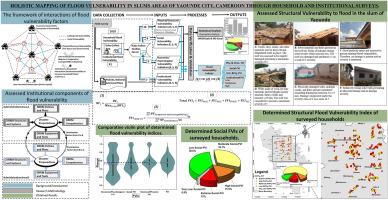Holistic mapping of flood vulnerability in slums areas of Yaounde city, Cameroon through household and institutional surveys
IF 4.2
1区 地球科学
Q1 GEOSCIENCES, MULTIDISCIPLINARY
International journal of disaster risk reduction
Pub Date : 2024-11-01
DOI:10.1016/j.ijdrr.2024.104947
引用次数: 0
Abstract
Urbanization in major cities has resulted in increasing urban slum expansion. This, together with increased climate-change-driven hazards, and deplorable slum characteristics has led to considerably higher flood impacts in slum settlements. As such, there is a need for specialized flood vulnerability assessment tools that integrate features specific to the urban slums. Studies have consecrated efforts to integrated and multidimensional flood vulnerability studies. However, assessments that include social, economic, structural, and institutional realities of the slum settlements are rare in developing countries. This study comprehensively assessed the flood vulnerability in urban slums. It offers a simplified perspective of vulnerability in urban slums, capturing data from slum inhabitants, local councils, experts, and local NGOs since they often have profound insights into essential service availability, access, and quality within the study area. Utilizing data encompassing 40 indicators (exposure, susceptibility, and resilience), we assess the physical/structural, social, and economic/psychological vulnerability indices for slum households and the institutional vulnerability of 41 entities. Despite significant challenges of poor infrastructure and lack of basic disaster management tools, slum residents have developed recognizable strategies to overcome flooding. Institutions carrying out intervention activities in the slums were largely incompetent and plagued with challenges ranging from lack of technical know-how to access to funds and coordination. Finally, a significant gap exists between state efforts and the impacts of these efforts on the residents of these slums. These findings complement household-level data and provide an expanded understanding of vulnerability patterns, thus informing policymakers about interventions.

通过家庭和机构调查对喀麦隆雅温得市贫民窟地区的洪水脆弱性进行整体测绘
大城市的城市化导致城市贫民窟日益扩大。这种情况,再加上气候变化导致的危害增加,以及贫民窟的恶劣特征,导致贫民窟住区受到的洪水影响大大增加。因此,需要有专门的洪水脆弱性评估工具,将城市贫民窟的具体特点纳入其中。各项研究都致力于综合、多维度的洪水脆弱性研究。然而,在发展中国家,将贫民窟的社会、经济、结构和制度现实纳入评估的情况并不多见。本研究全面评估了城市贫民窟的洪水脆弱性。由于贫民窟居民、地方议会、专家和地方非政府组织往往对研究区域内基本服务的可用性、获取途径和质量有着深刻的见解,因此本研究从简化的角度对城市贫民窟的脆弱性进行了评估,并从贫民窟居民、地方议会、专家和地方非政府组织那里获取了数据。利用包含 40 个指标(暴露、易受影响程度和复原力)的数据,我们对贫民窟家庭的物质/结构、社会和经济/心理脆弱性指数以及 41 个实体的机构脆弱性进行了评估。尽管面临基础设施薄弱、缺乏基本灾害管理工具等重大挑战,贫民窟居民仍制定了可识别的策略来克服洪灾。在贫民窟开展干预活动的机构大多能力不足,面临着从缺乏技术诀窍到获取资金和协调等各种挑战。最后,国家所做的努力与这些努力对贫民窟居民的影响之间存在巨大差距。这些研究结果补充了家庭层面的数据,扩大了对脆弱性模式的理解,从而为政策制定者提供了有关干预措施的信息。
本文章由计算机程序翻译,如有差异,请以英文原文为准。
求助全文
约1分钟内获得全文
求助全文
来源期刊

International journal of disaster risk reduction
GEOSCIENCES, MULTIDISCIPLINARYMETEOROLOGY-METEOROLOGY & ATMOSPHERIC SCIENCES
CiteScore
8.70
自引率
18.00%
发文量
688
审稿时长
79 days
期刊介绍:
The International Journal of Disaster Risk Reduction (IJDRR) is the journal for researchers, policymakers and practitioners across diverse disciplines: earth sciences and their implications; environmental sciences; engineering; urban studies; geography; and the social sciences. IJDRR publishes fundamental and applied research, critical reviews, policy papers and case studies with a particular focus on multi-disciplinary research that aims to reduce the impact of natural, technological, social and intentional disasters. IJDRR stimulates exchange of ideas and knowledge transfer on disaster research, mitigation, adaptation, prevention and risk reduction at all geographical scales: local, national and international.
Key topics:-
-multifaceted disaster and cascading disasters
-the development of disaster risk reduction strategies and techniques
-discussion and development of effective warning and educational systems for risk management at all levels
-disasters associated with climate change
-vulnerability analysis and vulnerability trends
-emerging risks
-resilience against disasters.
The journal particularly encourages papers that approach risk from a multi-disciplinary perspective.
 求助内容:
求助内容: 应助结果提醒方式:
应助结果提醒方式:


